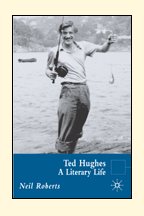Title: Ted Hughes: A Literary Life Author: Neil Roberts Publisher: Macmillan.(Nov. 2006) ISBN: 1-4039-3605-6 Price: £45.00 US$69.00 (hardback) 245 pages

“As a young man, Ted Hughes must have seemed blessed. He was extravagantly gifted, as his juvenile poetry shows, and was warmly encouraged by his family and teachers. From a socially and economically modest background in Yorkshire, he won a place at Cambridge, despite performing poorly in his entrance exam: his teacher persuaded the college to accept him because of his talent as a writer”.
Such was the beginning of a writing life which eventually led to Ted Hughes being offered the most prestigious position for any poet in Britain, that of Poet Laureate. This was a position he occupied for fourteen years until his death in 1998.
What made him such an honoured poet? And how did he overcome the huge personal traumas of the death of Sylvia Plath, and of Assia Wevill and her daughter Shura, and the resulting notoriety and animosity which dogged him for the rest of his life?
Neil Roberts’s book, Ted Hughes: A Literary Life, does, to a large extent, answer these questions. But this book is not a biography, although Roberts has consulted biographies as well as many of Hughes’s very personal letters to family and close friends. He includes a chapter on Hughes’s poetic collaboration with Sylvia Plath and the influence of her work on his; and he bravely wades into the “Plath Wars”, looks at many of the accusations made against Hughes, and presents an admirably informed and balanced view of their validity. Undoubtedly, there will be Plath followers who do not agree with him, but many of them are not inclined to agree with any favourable or balanced view of Ted Hughes.
Nor is Roberts’s book a hagiography. Roberts offers a critical appraisal of most of Ted Hughes’s work based on his own close reading over it over many years and on meticulous research amongst the many texts and manuscripts currently available.
Mostly, this book is an attempt to show how Ted Hughes’s work was shaped by his experiences, especially those of his earliest years, and how a core of deeply held beliefs was consistently expressed by and in his poetry. It presents a well supported argument for Roberts’s belief that “Nothing Hughes wrote which was not to some degree a report of his inner life had any value for him”. All of which is consistent with the requirements of this series of books commissioned by Palgrave Macmillan to cover the lives and careers of “admired and influential English-language authors”, and trace “the professional, publishing and social contexts” which shaped their writing.
Not everyone will agree with Roberts’s interpretation of Hughes’s views or with his analysis of the poems. And Roberts himself quotes Hughes’s own words in a letter to Keith Sagar: “Finally, poems belong to readers, just as houses belong to those who live in them & not to the builders”, by which Hughes implied that just as we furnish our houses according to our own taste, so our interpretation of a poem is a reflection of our individual response to it. Nevertheless, Roberts is an acute and sensitive observer of the language and rhythm of Hughes’s poetry, and his discussion of many of the poems and most of the poetic sequences is perceptive and interesting.
In essence, this book is valuable background reading for any discussion of Ted Hughes’s life and work and it invites a response from readers. Some (like Keith Sagar and myself) who are especially interested in Hughes’s work, will respond by carrying on discussions with Roberts over certain points and taking issue with him over others. I, for example regret that Roberts has not considered my own detailed analysis of Birthday Letters and Howls & Whispers. It would, perhaps, have resolved some of the issues he raises about these sequences of poems. It is a pity that many academics (unlike their students) still regard Internet publication with suspicion and feel that they can justifiably ignore it. This is not necessarily true of Neil Roberts, who now says that he should have included my work on these sequences his discussion, and who does refer to other items on my web-pages in his book. Nor is it true amongst scientists, who have long accepted on-line publication in moderated journals as a very important way of presenting new discoveries and theories for debate and confirmation.
This aside, I mostly agree with Roberts’s interpretation of Hughes’s life and work, especially with his description of Hughes as a shamanic poet who, like Shakespeare, Blake, Yeats and Eliot, consistently drew for inspiration on his inner world. He mentions Hughes’s use of memory and visualization, his concern about ecological issues, and he traces the shamanic pattern of some of Hughes’s work. It is a pity then, that like others who have discussed Hughes’s interest in shamanism, he does not follow this through and see that Hughes’s purpose was not just self-healing but, through the shaping, structure and especially the publication of his work, an intentional channelling of healing imaginative energies into a society which sorely needs them. Hughes’s very serious interest in the ancient occult, spiritual practices which were actively used by Renaissance poets was also part of this shamanic purpose and it, too, shaped his life and work.
© Ann Skea 2006. For permission to quote any part of this document contact Dr Ann Skea at ann@skea.com